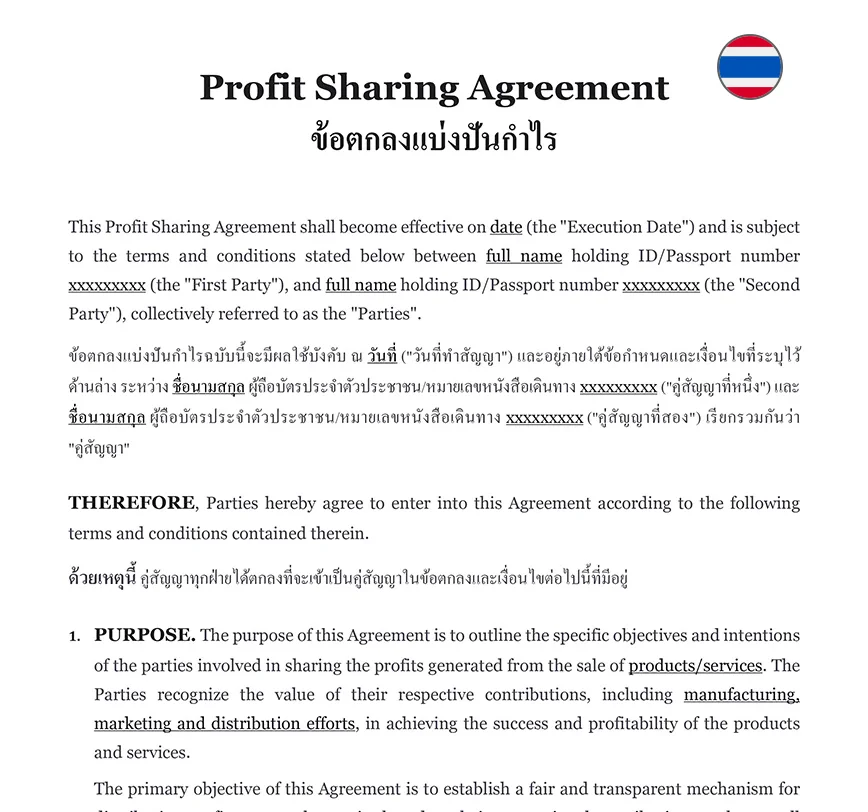Ready to use legal template
Drafted by experienced lawyers
Certified Thai-English translation
Ready to use legal template
Drafted by lawyers
Translated in Thai-English
Home › Business contracts › Profit Sharing Agreement
Learn more about Profit Sharing Agreement
A Profit Sharing Agreement in Thailand is a crucial document that defines how profits will be distributed among parties in various collaborative ventures, including partnerships, joint ventures, and investment agreements. It serves as a roadmap for allocating financial rewards based on each party’s contributions and responsibilities. At Themis Partner, we recognize the significance of well-structured Profit Sharing Agreements in fostering equitable partnerships. That’s why we offer an easily customizable legal template, meticulously crafted by experienced lawyers to align with Thailand’s legal framework. Our template simplifies the process of drafting a Profit Sharing Agreement, ensuring it accurately represents the parties’ intentions while offering legal safeguards.
Table of contents
-
What is a Profit Sharing Agreement in Thailand?
-
How does a Profit Sharing Agreement work?
-
Is a Profit Sharing Agreement legally binding in Thailand?
-
What are the common uses of Profit Sharing Agreements?
-
What does a Profit Sharing Agreement include?
-
What happens in case of disputes or changes?
-
What are the tax implications of profit sharing in Thailand?
What is a Profit Sharing Agreement in Thailand?
A Profit Sharing Agreement in Thailand is a formal contract that outlines the terms and conditions governing the distribution and allocation of profits among parties involved in a business collaboration, investment, or joint venture. This agreement specifies how the profits generated from a particular project, business venture, or partnership will be calculated, divided, and distributed among the participating parties. It defines each party’s share of the profits based on their contributions, roles, and responsibilities, ensuring transparency and fairness in the distribution process. Profit Sharing Agreements in Thailand are commonly used in various contexts, including partnerships, joint ventures, franchising arrangements, and revenue-sharing agreements, to establish clear guidelines for sharing financial gains while adhering to Thai legal requirements and regulations.
How does a Profit Sharing Agreement work?
A Profit Sharing Agreement in Thailand functions as a structured contract that governs how profits are determined, allocated, and distributed among participating parties in a business collaboration or venture. It outlines the roles, contributions, and responsibilities of each party, specifies the method for profit calculation, defines the timing and frequency of profit distribution, addresses tax considerations, provides mechanisms for dispute resolution and amendments, and may include confidentiality clauses. This agreement ensures transparency, fairness, and effective management of profit-sharing arrangements while adhering to Thai legal requirements and promoting equitable sharing of financial gains.
Is a Profit Sharing Agreement legally binding in Thailand?
A Profit Sharing Agreement can be legally binding if it meets essential criteria, including clear and specific terms, an intention to create legal relations, consideration, compliance with Thai law, mutual consent, and proper execution. These agreements outline the allocation and distribution of profits among parties involved in a business collaboration. However, the enforceability of specific clauses within the agreement may vary, and parties are strongly advised to seek legal counsel to ensure compliance with Thai legal requirements and to address potential challenges or disputes that may arise in the future.
What are the common uses of Profit Sharing Agreements?
Profit Sharing Agreements in Thailand serve a multitude of purposes across various industries and collaborations, including business partnerships, investment arrangements, joint ventures, franchising operations, real estate development, entertainment projects, technology collaborations, sales and marketing partnerships, energy sector ventures, consulting services, investment clubs, and natural resource projects. These agreements are instrumental in defining how profits are distributed among parties based on their contributions and roles within the collaboration, promoting fairness and transparency in financial arrangements. They can be customized to suit the specific needs and objectives of parties, making them versatile tools for establishing clear guidelines for profit allocation in diverse business ventures and projects.
What does a Profit Sharing Agreement include?
A comprehensive Profit Sharing Agreement in Thailand typically includes several key elements and provisions to ensure clarity and enforceability. These elements may include:
1. Parties
The agreement identifies all parties involved in the profit-sharing arrangement, specifying their names, roles, and contact information.
2. Purpose
It outlines the purpose of the agreement and the specific venture or project from which profits will be generated.
3. Profit Calculation
The agreement details the method or formula used to calculate profits, specifying which financial metrics and factors are considered in the calculation.
4. Profit Allocation
It outlines how profits will be allocated among the parties, including whether profits will be distributed as a percentage of revenue, a fixed amount, or through another agreed-upon method.
5. Timing and Frequency
The agreement specifies when and how often profits will be distributed, whether it’s on a regular basis (e.g., monthly, quarterly) or upon the achievement of specific milestones or targets.
6. Taxes and Deductions
It addresses tax considerations, including how taxes on profits will be handled and any relevant withholding tax requirements in Thailand.
7. Dispute Resolution
The agreement may include mechanisms for resolving disputes related to profit-sharing, such as mediation or arbitration, to facilitate effective conflict resolution.
8. Amendments
Parties may outline a process for making changes or amendments to the profit-sharing terms, ensuring flexibility to adapt to changing circumstances.
9. Termination
The agreement specifies under what conditions the profit-sharing arrangement may be terminated and the consequences of such termination.
10. Confidentiality
It may include confidentiality clauses to protect sensitive financial information and trade secrets related to the profit-sharing venture.
What happens in case of disputes or changes?
In case of disputes arising within a Profit Sharing Agreement in Thailand, parties typically follow predefined dispute resolution mechanisms such as negotiation, mediation, or arbitration, with the aim of reaching a resolution. These mechanisms may be outlined within the agreement. Changes or amendments to the agreement are made through a structured process requiring written consent from all parties involved, clearly specifying the nature and intended effects of the modifications. This ensures that disputes are addressed systematically and that any changes to the agreement are executed in a manner agreed upon by all parties, promoting transparency and effective conflict resolution while adhering to Thai legal requirements.
What are the tax implications of profit sharing in Thailand?
The tax implications of profit sharing in Thailand are multifaceted and contingent on factors such as the legal structure of the entities involved and the specific terms of the Profit Sharing Agreement. Individuals may be subject to personal income tax, while registered legal entities could face corporate income tax on their share of profits. Withholding tax may also apply, depending on the nature of income and applicable tax treaties. Value-Added Tax (VAT) may be relevant for certain arrangements involving goods or services. Proper tax planning, compliance, and seeking professional advice are essential to manage tax liabilities effectively while adhering to Thai tax laws and regulations, minimizing the risk of penalties, and optimizing financial outcomes.
SPECIAL OFFER
Startup
15 Document Package
Essential documents for running your business in Thailand
Profit Sharing AgreementTemplate (.docx)
Save on attorney fees
310 client reviews (4.8/5) ⭐⭐⭐⭐⭐
Share information
Why Themis Partner?
Easy legal documents at your fingertips
Make trusted documents for hundreds of purposes.
Hundreds of documents
Instant access to our entire library of documents for Thailand.
24/7 legal support
Quick legal advice from our network of qualified lawyers.
Easily customized
Editable Word documents, unlimited revisions and copies.
No translation fees
Certified Thai-English translation included for all documents.
Legal and Reliable
Documents written by lawyers that you can use with confidence.
Free consultation
Free lawyer consultation on each new matter.




